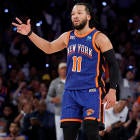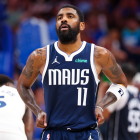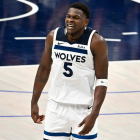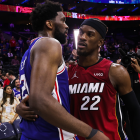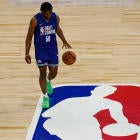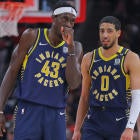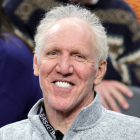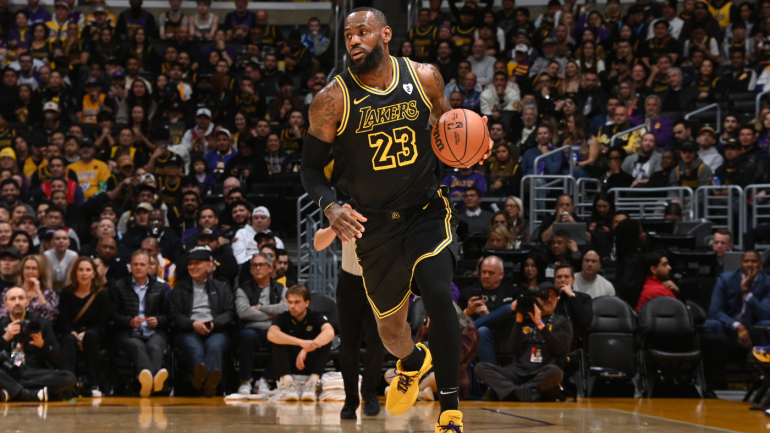
The Los Angeles Lakers made a rare conservative choice on Thursday when they elected to allow the trade deadline to pass without making a move of any kind. As disappointing as that might be to fans (and the hourglass-tweeting LeBron James), it was a sensible approach on paper.
The Lakers entered deadline day with a 27-25 record. They ranked 20th in offense and 14th in defense, hardly the peripherals of a true contender. Last year's Lakers didn't look like one in February either, but the fixes were relatively straightforward. Get James and Anthony Davis back on the court and get Russell Westbrook off of it. A healthy Laker team with a better-fitting supporting cast rode a favorable bracket all the way to the Western Conference Finals.
The fixes weren't as clear this time around.
While James and Davis have largely been healthy, the Lakers didn't have a big expiring contract to dangle or a glaring negative to remove from the rotation. They are just a team that has played mediocre basketball and needed meaningful changes to fix that. In a trade market that featured very little movement among even high-level role players, those changes didn't seem to be available. So the Lakers didn't force the issue. They decided to wait.
But what they're waiting for? That's a bit more of a pipe dream. Bleacher Report's Chris Haynes reported ahead of the deadline that the Lakers plan to wait until the summer to make their move. At that point, the Stepien Rule restrictions that limited them to offering only one first-round pick in a trade during the season will lighten. The Lakers will have access to three first-round picks and three first-round swaps to trade with. At that point, Haynes reports, the Lakers will try to trade for a superstar. Our own Bill Reiter has already reported one possible name: Donovan Mitchell.
This is, effectively, the strategy the Lakers have employed for their entire history. Though there are occasional gaps like the five years between Magic Johnson and Shaquille O'Neal or the three years between Kobe Bryant and James, the Lakers have fairly transitioned from superstar to superstar to superstar for the past six decades. This is where Lakers exceptionalism comes from. If all the Lakers have ever known is superstar acquisitions, then why would they think acquiring superstars would be especially difficult?
The reality here is far more complicated. In the modern NBA, three first-round picks just isn't that many. When the offseason arrives, the Nets will have eight first-round picks available to trade. The Knicks will have nine. The Spurs, Jazz and Thunder will all be in double digits. In a pure bidding war, the Lakers stand no chance against any of these teams.
Which begs the question of why exactly the Lakers think they have a realistic chance at a player like Mitchell. He has been linked to New York for years. Even if he does leave a Cavaliers team that has lit the NBA on fire for the past month, wouldn't his hometown Knicks or Nets, with far more to trade, make more sense?
The obvious answer here is yes, but when your entire franchise history suggests you should go for it anyway, it's not hard to see why the Lakers want to try to do so. Of course, the NBA has changed quite a bit since the Lakers accumulated most of those past stars. Even as recently as 2018, it was fairly common for players to change teams through free agency. The Lakers could clear cap space and bet on their market and history to do the rest. This is how they got James.
But in the "extend now, get traded later" era of NBA history we currently exist within, player preference tends to matter less and less in these matters than it once did. If Damian Lillard, a 33-year-old with an onerous long-term contract, couldn't get to the Miami Heat as he planned, what hope would a younger star have of forcing his way to the Lakers when their team has been seriously outbid?
A slightly more plausible path for the Lakers would be to pursue a star with some warts. The Clippers just got James Harden for what is now looking like a pittance because he had no other market. The Mavericks got Kyrie Irving on a somewhat similar discount, though his market was slightly wider. Harden's defensive and playoff concerns limited his pool of suitors. As did Irving's off-court issues.
Are any players like that going to be available this offseason? Potentially. Trae Young stands out in this regard. He's an even more limited defender than Harden, and he only really makes sense in a situation in which he can play an extremely ball-dominant style. He, like James and Davis, is represented by Klutch Sports. The Lakers have been linked to him in the past. If the Lakers are interested in building around two big men, Minnesota's luxury tax issues are eventually going to force the Timberwolves to consider Karl-Anthony Towns' future. Of course, if they go on a lengthy playoff run, they'll likely pay what it takes to keep the team together.
Even still, the Lakers have very little control over the star trade market. The stars have to align from them. If the New York teams and a few of the other asset hoarders decide they're doing whatever it takes to add All-Stars this summer? The Lakers are out of luck. They don't have the assets to compete. Even if the right player becomes available, all it takes is one other interested party to knock the Lakers out of the running. The point guard-needy Spurs make plenty of sense for Young. Minnesota would probably prefer win-now assets for Towns anyway.
This is the danger of the star-centric approach the Lakers seem to be taking. Just because they've always been able to land these kinds of players doesn't mean they're automatically equipped to do so again. Of course, it's also worth asking whether or not they should even want to.
The Lakers won their 2020 championship with two stars and a great supporting cast. With three first-round picks over the summer, they could replenish the team around James and Davis and potentially try to recreate that formula. Would that be possible as James enters his 40s? It's too early to tell and would frankly rely on which players are and aren't available. There's no easy path here, no one-size-fits-all solution. Getting the Lakers back into the championship picture is going to require significant changes and a more thoughtfully-constructed overall roster.
That's what makes the "let's hold and wait for a star" approach so perplexing. It's not an attempt to address the actual flaws plaguing this team right now. It's an attempt to solve a contemporary problem with an old solution. The Lakers can't just rely on getting stars by being the Lakers anymore.














